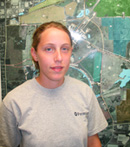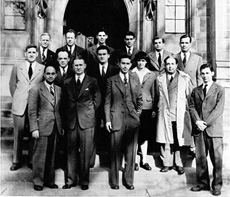|
Mon., July 2
PARTICLE ASTROPHYSICS SEMINARS WILL RESUME IN THE FALL
3:00 p.m.
Accelerator Physics and Technology Seminar - Curia II (NOTE DATE, TIME, LOCATION)
Speaker: E. Métral, CERN
Title: TMCI Revealed by Frequency Analysis of Headtail
Tracking Data Using SUSSIX
3:30 p.m.
DIRECTOR'S COFFEE BREAK - 2nd Flr X-Over
4:00 p.m.
All Experimenters' Meeting - Curia II
Special Topic: T-958/LHC Forward Proton Fast Timing Test
Tue., July 3
11:00 a.m.
Accelerator Physics and Technology Seminar - Curia II (NOTE TIME, LOCATION)
Speaker: M. Giovannozzi, CERN
Title: Resonant Multi-Turn Extraction Project: Principle and
Experiments at the CERN Proton Synchrotron
12:00 p.m.
Summer Lecture Series - Curia II (NOTE LOCATION)
Speaker: A. Warner, Fermilab
Title: Accelerators
3:30 p.m.
DIRECTOR'S COFFEE BREAK - 2nd Flr X-Over
Click here for NALCAL,
a weekly calendar with links to additional information. |
|
Wednesday, July 4
Lunch
Closed
Thursday, July 5
Dinner
Closed
Chez Leon Menu
Call x4598 to make your reservation. |
|
|
First Betz intern to carry on prairie restoration legacy
 |
| Natalie Dierx is the first Betz Intern. |
Robert Betz, Fermilab's founding father of prairie restoration, began his mission in 1973 and restored almost 20 percent of the native prairie species on site before his recent passing in April.
This summer, 18-year-old Natalie Dierx will carry on Betz's legacy through a Fermilab-funded internship. Despite growing up in urban and industrial Ontario, Canada, she has taken a passionate interest in the wide-open Illinois prairie and has managed to earn a spot as the first Betz Intern this year.
Encouraged by a high school ecology teacher to learn about environmental science, Dierx, who now lives in the southwest suburbs in Chicago, founded her high school ecology club and worked with other students to build a prairie in her school's courtyard. She now wants to become a conservational biologist after she completes her coursework in Environment and Resource Studies at the University of Waterloo in Ontario.
"I think [the prairie] is something we should preserve," said Dierx. "I want my kids to see a preserved environment."
In the Fermilab fields, Dierx works closely with Roads and Grounds' Bob Lootens and on-call restoration worker Rachel Bridger. Their primary job is to help the area's biodiversity by picking seeds and distributing them to places lacking in certain plant species.
"Natalie is very self-motivated. It's not easy to spend six or seven hours everyday collecting seed, and there is a huge need for her this summer. We are finding and distributing all these seeds that matured this summer, and this means more diversity in Fermilab's prairies and woodlands," Lootens said. "Through this internship, individuals have the opportunity to help us enrich our prairies with species that will mature earlier in the year."
A memorial service honoring the life of Bob Betz and his lasting influence on Fermilab and the region will take place on Saturday, July 7, at 2 p.m. in Ramsey Auditorium. The event will highlight the great contributions that Bob made to prairie conservation and restoration in Illinois, in particular his work at Fermilab and its National Environmental Research Park. Click here for more information.
-- Lauren Younis
|
Remembering Albert Wattenberg
From the News-Gazette, June 30, 2007

Albert Wattenberg (front row third from left) with Enrico Fermi and other scientists who worked on the first controlled self-sustaining nuclear chain reaction.
URBANA - Albert Wattenberg, 90, retired University of Illinois physics professor, and one of the scientists who worked with Enrico Fermi on the first controlled release of nuclear energy, died June 27, 2007, at Clark-Lindsey Village.
Al was born in New York City, a few days after America entered World War I. He attended public schools in Manhattan, before entering City College of New York, where in the 1930s he first demonstrated his lifelong commitment to peace, freedom and justice by organizing several student strikes. He was president of his graduation class but refused to attend graduation because the officiating officer was friendly with the Italian Fascists. In 1939 he began a graduate program in physics at Columbia University. When Fermi left Columbia to work on what would be the Manhattan project to build an atomic bomb, he recruited Al to accompany him to the University of Chicago, where on Dec. 2, 1942, in a squash court under the stands at Stagg Field, they inaugurated the era of atomic power. In commemoration, the physicists shared a bottle of Chianti and all signed the bottle as a record of who was there. Al kept the bottle for many years before donating it to the national archives.
Al's recollection of the war years always conveyed the urgency the physicists felt as they worked on this project because they feared the Nazis would develop an atomic bomb first, yet he was ambivalent about the course of the Manhattan project as directed by General Leslie Groves. When Fermi left to work on the bomb at Los Alamos National Laboratories in New Mexico, Al stayed in Chicago, and worked with Leo Szilard, who had theorized and patented the idea of a nuclear chain reaction, and who had drafted the letter Albert Einstein sent to President Roosevelt informing him of the possibility of atomic weapons. In 1945, Al was one of the signers of the petition Szilard sent to the government declaring that the unannounced use of nuclear weapons on Japan at that stage of the war would be immoral. After the bombs were dropped on Hiroshima and Nagasaki, Al was one of the founders in September 1945 of the peace-focused organization The Federation of Atomic Scientists, which began publishing the Bulletin of the Atomic Scientists, with its famed doomsday clock on the cover.
Read more |
|
|
Drill bits

Half-round drill bits as pictured are often used for horizontal drilling in brass.
During the week of June 18, 2007 three unrelated power drill injuries occurred at Fermilab, an unusual number of cases for a single activity.
In the first and most serious injury, an employee's left forearm was lacerated by a piece of brass that seized on a bit in a drill press and spun around. Fifteen sutures were applied to close the wound. When working with drills, it is important to know which bits are optimal for different applications. Investigation revealed the worker had used twist drill bits for use with hard metals. For softer metals like brass and copper, twist bits with flattened cutting edges or half-round bits are preferred. These are less likely to grab the softer material.
In the second injury, tiny metal slivers entered an employee's left palm as he inserted drill bits into a drill. These were apparently metal particles that became dislodged during handling. To prevent injuries such as this, it is important to wipe all debris from drill bits after use. This can be done with a clean cloth or disposable tissue, and a spray cleaner or other mild oil can be used if necessary.
In the third case, a worker lacerated his left index finger when a screwdriver drill bit slipped off a drywall screw. This kind of accident can be avoided by using a bit equipped with a magnetic holder and sleeve.
ES&H would like to thank veteran Fermilab machinists Jim Wilson and Don Fisher for their assistance in preparing this article.
Safety Tip of the Week Archive
|
SciBooNE begins taking data
The SciBooNE collaboration has finished the commissioning of its detector and has begun to take physics quality data.
View the SciBooNE web site.
|
Interactions.org,
June 29, 2007
Germany's Largest Research Instrument Finishes Experiments
DESY's particle accelerator HERA shuts down
On June 30, 2007, data taking at the electron-proton storage ring HERA at DESY will come to an end. For 15 years, deep in the earth beneath Hamburg, electrons and protons have smashed into one another. "The particle physics experiments at HERA have provided a unique and detailed picture of the proton and the interacting forces that will not be surpassed by any accelerator in the world for many years," said Professor Rolf-Dieter Heuer, research director for particle physics at DESY. "On the one hand, the precision measurements have a great influence on particle physics theory; on the other hand they are a good basis for interpreting the exciting new physics that is expected from experiments at the Terascale in the coming years." The analysis of data measured at the 6.3 kilometer-long electron-proton storage ring will last far into the next decade. Some results have already found their way into physics textbooks.
Read more |
|
Accomplishment report information
It is that time of year again to reflect on our past year's performance. All employees must complete the 2006-2007 accomplishment report by July 15th. View the Employee Relations website for performance review timeline, instructions, forms, and resources.
NALWO prairie walk July 6
NALWO will host a prairie walk from 9 a.m. to 10:30 a.m. on Friday, July 6, 2007. Guided by Horticulturalist Mary Hawthorne, attendees will learn how to identify prairie plants and discuss their medicinal and edible uses, and can participate in a scavenger hunt to sharpen observational skills. The tour will meet in the Lederman Science Education Center parking lot at 9 a.m. Please bring a bottle of water, and wear socks and closed-toe shoes even if the weather is hot. Contact Selitha Raja by calling (630) 305-7769 or via email to attend. A large response may generate an additional walk in August.
Kyuki-Do classes
Kyuki-Do is a Korean martial art based on Taekwondo, but includes Hapkido, Judo, and Jujitsu. The next class will begin July 9 and run through August 15. Classes are held on Mondays and Wednesdays from 5:00 - 6:00 p.m. in the exercise room of the Recreation Facility. Cost is $45 per 6-week session. You must be a member of the Recreation Facility to join, and must register through the Recreation Office by July 6.
Additional Activities
|
|